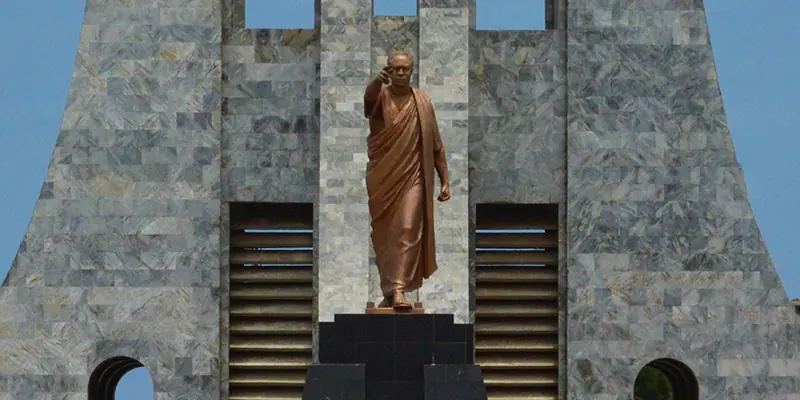African History
The Life of Kwame Nkrumah
The life of Kwame Nkrumah. Kwame Nkrumah, born in 1909 in Nkroful, Gold Coast (now Ghana), is a charismatic and influential figure in African history. With his desire for freedom, strategic thinking, and commitment to Pan-Africanism, he led Gold Coast, now Ghana, to independence from British rule. Due to his accomplishments and resilience, he became a symbol of hope for millions of people. After witnessing firsthand British colonial injustices, he made a lifelong mission to liberate the Gold Coast, now Ghana, and as a result inspired similar revolutions across Africa. Nkrumah’s journey from humble origins to becoming a major advocate for Pan-Africanism continues to captivate and inspire future generations, cementing his legacy as a symbol of unity and freedom on the continent.

The quote below reflects Nkrumah’s willingness to take risks and overcome challenges for the sake of freedom and self-determination. The fact that he led Ghana’s independence movement demonstrates his commitment to his people.
“We prefer self-government with danger to servitude in tranquility.”
– (Kwame Nkrumah)
Table of Contents
Kwame Nkrumah Early Life Story:
Nkrumah was born in a small village in the Gold Coast (now Ghana) in 1909, and he was directly exposed to the injustices caused by colonialism. His passion for learning led him to pursue higher education and receive scholarships to study in both America and Europe. In the company of other African intellectuals, he was introduced to a variety of ideologies and philosophies, including Pan-Africanism, which he ultimately adopted as his life’s philosophy. In his vision, the continent would be free of colonial domination and united together in its pursuit for development, prosperity and economic independence. These experiences fueled his desire for self-determination and strengthened his resolve to liberate his own country.
Kwame Nkrumah Personal Life
Kwame Nkrumah born on September 21st, 1909 in Nkroful, Gold Ghana and passed away on April 27, 1972, in Bucharest, Romania. Despite the fact that Nkrumah’s political career consumed the most of his life, he found time for his personal life on occasion. Nkrumah’s political ambitions and personal life were inseparably linked. After getting married to Fathia Nkrumah in 1957, the couple had three kids. His dedication to his political goals frequently came at the sacrifice of family time. Nkrumah’s political activities also affected his personal life. He was imprisoned multiple times by the British due to his push for independence. There were also numerous attempts to assassinate him. Ultimately, his commitment to Ghana’s independence and his role as a Pan-African leader often overshadowed his family life.
Career Accomplishments
Kwame Nkrumah was a well-educated individual who studied both in the United States of America and in London, England. During his studies in the United States, he attended prestigious institutions such as Lincoln University and the University of Pennsylvania, where he obtained several degrees, including;
- Bachelor of Arts in Economics and Sociology (1939) – Lincoln University, Pennsylvania, USA
- Bachelor of Theology (1943) – Lincoln University, Pennsylvania, USA
- Master of Science in Education (1942) – University of Pennsylvania, Pennsylvania, USA.
- Master of Arts in Philosophy (1943) – University of Pennsylvania, Pennsylvania, USA
He began a doctoral program in philosophy at the University of Pennsylvania, he did not complete it. Nkrumah held a number of positions in black nationalist groups that promoted African unity and independence while a student in England. Nkrumah also participated in founding the Pan-African Congress in 1945. History has shown that this particular organization played an important role in the fight against colonialism in Africa.
Political Achievements in Ghana
After returning from overseas in 1947, he became the General Secretary of the United Gold Coast Convention (UGCC). Joseph Kwame Kyeretwie Boakye Danquah started the UGCC and argued for the right of individuals to form their own government. In 1949, Nkrumah established the Convention People’s Party (CPP), which advocated nonviolent opposition. Furthermore, swiftly rose to prominence in the independence movement. In 1950, he launched a nonviolent disobedience campaign against British colonial rule. He also led the CPP to victory in the 1951 elections, becoming Prime Minister and championing the battle for independence.
After years of political negotiations with the British, Nkrumah achieved the ultimate goal of independence for the Gold Coast. In 1957, Ghana finally broke free from British rule, and the new nation of Ghana was born, with Nkrumah as its first Prime Minister. He embarked on ambitious plans for economic development and social reform, aiming to create a self-sufficient and prosperous nation.
What was Kwame Nkrumah’s most known for?
Nkrumah’s most enduring legacy lies in his commitment to Pan-Africanism. He believed in the unity and solidarity of all African nations and advocated for collaboration and cooperation to overcome colonial legacies and build a strong, independent Africa. Concurrently, He played a pivotal role in the creation of the Organization of African Unity (OAU), a symbol of Pan-African unity and collective action. Best known for:
- Led Ghana to independence from British rule in 1957
- Founded the Convention People’s Party (CPP)
- First Prime Minister and President of Ghana
- Advocated for Pan-Africanism and unity among African nations
What was Kwame Nkrumah’s Legacy?
Despite the challenges, Nkrumah’s legacy endures. Kwame Nkrumah is remembered as a key figure of the African independence movement, inspiring nations throughout the continent to fight for their freedom. The vision of unity and collaboration among African nations, which he advocated for through Pan-Africanism, is still relevant today. Despite his controversial later years, his contributions to Ghana’s development and his unwavering commitment to African liberation make him a true hero of African history
Conclusion
To conclude, Kwame Nkrumah’s life and legacy are inspiring examples of personal courage, perseverance, and dedication. His journey from experiencing colonial injustices in his home Ghana to becoming one of Africa’s influential leaders is an inspiration to many individuals working for their own freedom and a more just world.
Nkrumah’s commitment to Pan-Africanism, as well as African unity, still resonates today. He recognized the necessity of collective effort to overcome the continent’s issues and actively fought to build a stronger and united Africa. His vision of a united Africa free of colonialism has influenced generations of politicians and activists. In addition to his political accomplishments, Nkrumah’s life is an inspiring example that even the most difficult conditions can be overcome.
While his leadership in Ghana came to an end in 1966 with a military coup, his legacy transcends any single nation or political system. Furthermore, continues to be a symbol of emancipation, unity, and the ability of individual action to effect change and unite a nation. In conclusion, below are some great words of encouragement and counsel from Kwame Nkrumah:
Kwame Nkrumah Famous Words and Quotes
- “Action without thought is empty. Thought without action is blind.” ~ Kwame Nkrumah
- “We face neither East nor West; We face forward”. ~ Kwame Nkrumah, Conference speech delivered in Accra, 1960
- “I am not African because I was born in Africa but because Africa was born in me.” ~ Kwame Nkrumah
- “Africa is one continent, one people, and one nation”. ~ Kwame Nkrumah, 1970.
- “Our independence is meaningless unless it is linked up with total liberation of Africa.” ~ Kwame Nkrumah, 1957 Independence Speech, Accra, Ghana
We express our gratitude to you Francis Nwia-Kofi Ngonloma, (Kwame Nkrumah) for a life well lived, a job well done, and a mission accomplished. Thank You!
Afroluent.com
